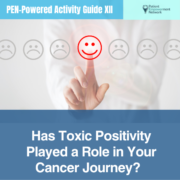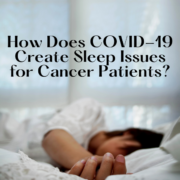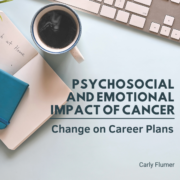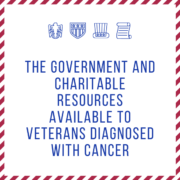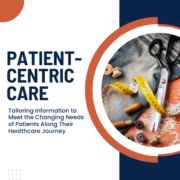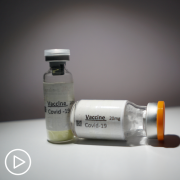Has Toxic Positivity Played a Role in Your Cancer Journey?
Has Toxic Positivity Played a Role in Your Cancer Journey? from Patient Empowerment Network on Vimeo.
Toxic positivity is a buzzword that has been thrown around lately. Lisa, Thomas, Donna and Diana all share their thoughts on toxic positivity and how it plays a role in their lives now.
See More from PEN-Powered Activity Guide 12
Transcript:
Lisa Hatfield:
So, talking about being positive and optimistic, and I don’t know if any of you heard of the phrase, it’s kind of a trendy buzzword or buzz phrase, toxic positivity, and I’ve only heard it once, and somebody had mentioned to me that I was too Pollyanna-ish with my diagnosis, and I think we’ve all mentioned it, it’s not… We can be positive, but it doesn’t mean we don’t have days that are a little bit darker or a little… We feel a little more down… It’s just that we tend to focus more on the positives when they’re there… Which they’re there a lot of the time, I mean, post there a lot of time. So, I actually had to look this up because I didn’t know the best definition of toxic positivity, and then I had… I brought up here, I want your thoughts on this. So this is from Psychology Today, I’m not sure if that’s a legitimate source, but they describe or Psychology Today explains toxic positivity as the act of avoiding, suppressing or rejecting negative emotions or experiences, this may take the form of denying your own emotions or someone else, denying your emotions insisting on positive thinking instead, so people say things, Well, look on the bright side, you get a lot of casseroles when you have cancer, which is true, and that’s great, but sometimes you’re not in the mood to hear that.
Toxic positivity. What are your thoughts on that? To me, it almost sounds like maybe the positivity isn’t what’s toxic, it’s just people are in denial or avoidance of a situation, which is… I think I’m not a professional, but it seems pretty natural, especially when you’re first diagnosed, have you ever experienced toxic positivity or thought about it, or know anything about it, heard about it? Diana?
Diana:
I mean like you, I had to look it up. When it was brought to my attention. And like you, I tend to take the positive route because that’s what’s best for me, but it’s okay not to be okay also, and I do acknowledge that in my book, there are some serious excerpts and there’s some serious quotes in the book, but I just… I think each person is different, and I appreciate it when people relate it to me in a positive manner, you know, I knew they were lying when they said, you look great bald, you have a great head. I’m like I really don’t, I really don’t but I still wonder to this day, I watch football and I’m looking at these guys with this long hair underneath their helmet, I’m like, why, if you’re a man, I would shave my head every day. But I’m totally going off subject here, but I just think it’s each individual person and how you respond to being positive, I think positivity begets positivity, you know humor begets humor. And kindness begets kindness. So, I don’t know, I’m a positive person.
Lisa Hatfield:
And we know that about you. Yeah, that’s awesome. And I think we feed off of that too, I know when we were all together in our meetings working on projects your positivity, cracking jokes and Thomas making us laugh for a variety of reasons every 10 minutes, it helped all of us feel better. I wasn’t in the best place when I arrived on that trip, having just gotten my bone marrow biopsy results, but when you were around people that feel good and act that way… You can’t help but feel like, Oh, this is awesome, this is great. It just changes your perspective and outlook. Donna, I think you were going to say something a minute ago. Do you remember? I thought you raised your hand.
Donna:
I was going to say something. I think for me, because I tend to be a pretty serious person, but I do like humor. After being diagnosed and several other family situations that were happening simultaneously, I had to think positive and I couldn’t be around anybody that wasn’t positive. I felt like anybody that was not positive or trying to be light on the subject was just too overwhelming for me. And I think the outcome from this, like I explained to you guys for a while ago, that I used to be an A plus plus person, just completely like your typical A plus plus person. And it’s changed me. And now when I speak to people or I speak to groups, whatever, and even in my own life, positivity, really a positive outlook really helps, and I think that’s one of the things that we should all stress, if any of us speak to any cancer survivors or anybody going through it is you have to find a place where you can just kind of think about something positive because you never know, and there’s always hope, and there’s great treatments out there, so if it’s all possible, think positive, that’s really how I feel.
And it taught me a great lesson to be honest with you.
Lisa Hatfield:
Great comments. Yeah.
Thomas:
Yeah, being the most tenured on the panel, I’ve had numerous… I’ve had three stem cell transplants, I’ve also relapsed numerous times afterwards, and toxic positivity is something that again, acceptance is a reason that I could answer, or I can speak on how I relate toxic positivity to myself. Some of the phrases that I use are, it’s just another test to add to my testimony, that’s the positive part about it, that I have a testimony and that I’ve relapsed, but this test is something that’s going to… I need this test to get back to add to my testimony to get to where I need to be right now.
So that’s what I took away from the toxic positivity aspect of the conversation, and then as I was speaking to one of my friends yesterday, he enlightened me in conversation, we’re talking, and then he gave a toxic positivity speech, unbeknownst that I was already talking about. I was thinking about some things that he said that his father-in-law passed away, and he said that he’s in a better place, and that’s the toxic positivity that he used to explain to his wife because his wife was struggling with it, and he had to tell her that, hey, although he’s gone, he’s in a better place.
So, we all use toxic positivity, and we don’t even know that we’re using it, but being that I’ve relapsed so many times, I utilize toxic positivity for myself because mentally, I need that drive to say, Okay, I relapsed again. I don’t want us to come to a dark place where I can’t believe I’m back into a position where… Why me, why me, why me, why me? And I just want to stay on the why not me side of the aspect, so that’s what I utilize toxic positivity for myself.
Lisa Hatfield:
Those are great comments, and I think you’re right, I think what is called toxic positivity is sometimes just acknowledging what is not so great, but trying to make a positive out of it because we have to… It’s part of survival mechanism sometimes, and so… Yeah.
Diana:
We have to keep from crying.
Thomas:
Yeah, that’s why… That one that I always say, this is just another test to add to my testimony, that’s just something that keeps me on a higher level to not be an it down in the dumps about my disease that I’ve relapsed once again.
Lisa Hatfield:
I love that comment too. It’s a great…
Diana:
I know I wrote it down.
Lisa Hatfield:
That’s a great mantra. Maybe you can make one for me too, I’ll put up on my wall here… Yeah, I love that. And I do think, yeah, sometimes I think people have wondered if I’m in denial about what’s going on, I have my dark days, but it’s not denial, it’s just sometimes choosing not to focus on the negative news because we have to keep propelling ourselves forward, dealing with what we have… Yeah, we have cancer. Sometimes I don’t like when people say, oh, you’re a cancer patient, well I’m a person who has cancer, but I know it’s a common thing to say as a cancer patient, so… Yes, we’re cancer patients.
Thomas:
But just say you’re a cancer survivor.
Lisa Hatfield:
Cancer survivor. That’s true. Yeah, that was true.
Lisa Hatfield:
Yeah, that is very true. So yeah, I think that that’s toxic positivity, it was something that somebody brought up to me before and said When I act kind of Pollyanna-ish, that that’s what that’s called… I had no idea what it was. I think I truly believe. I think sometimes people don’t know what to say. I think, Thomas, that you said that people just don’t know what to say when they know you have cancer, they don’t know what to say when they see you again and you look pretty good. Do I say she looks great? Do I say he looks good? Do I say, oh, I’m happy you’re doing well. They don’t really know, do you still have cancer, they don’t know if they can ask that question, so I think that… I’m not sure what I was going down a path with that, but I think people, whenever they say something, even if it sounds, may come across as, oh, you’re lucky you don’t have this or that, I think that’s another state of toxic positivity. It’s well-intended, I believe. I always believe people have the best intentions, they just don’t know what to say, so…
And for myself, I might choose toxic positivity. I’m not sure if mine’s toxic or not, but I choose positivity too, so thanks for all of those comments and then Donna? Yeah.
Donna:
I was just going to reiterate; I agree with you. I think it’s such an uncomfortable subject for patients and family and friends that they don’t know what to say, they try to say something positive. But sometimes it doesn’t come out. And for us, we have to be on a higher ground, we just have to be because we are dealing with something that’s emotional, physical, psychological, however you want to put it. And it’s a struggle some days. But the more we stay positive, the better we are, and like Thomas, Thomas has been through a lot, you’ve been through a lot, Diana and I’ve been through our own experiences, but we try to maintain positivity and… I really believe that it’s a very difficult subject, and there will always be a difficult subject for anybody to deal with whenever they’re diagnosed, so it’s difficult, but I think that we all try to figure out a better way to deal with it. And family is supportive, and so I try to get up every day and put my wig, my make-up on, and I had my uniform when I went out the door with a big smile, even if I was like dreading it.
But you just have to do it. And so, I think it’s important for all of us to just maintain as much as we can maintain.
Diana:
I was going to going to say, if you’re having one of those bad days, and like you said, most people are very well-meaning when they say something to you positive, again, just respond in a positive manner and then talk to somebody else who’s been there that you can vent about, like this group for me. I could vent with you… I worked for the Alzheimer’s Association for nearly 14 years. My mother died of younger onset Alzheimer’s, there’s nothing funny about that, there really isn’t… I felt like I could maybe joke about it because I’ve been there done that, but I didn’t want people coming up to me and saying, Oh, you work for the Alzheimer’s Association, I forgot that. You know that’s not funny, but you just try and respond because it’s an awkward situation, so just to respond to it in a positive manner and then you can… Vent to somebody who’s been there, done that.

